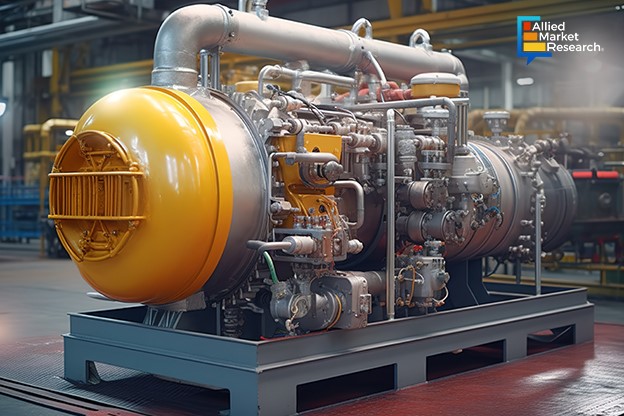How Do Turbine Control System Technology and Software Optimize Your Business Potential?

18 Apr
2024
Highlights
- Introduction
- Advanced technologies in turbine control system
- Role of turbine control system software
- Key partnerships
A turbine control system, commonly known as a TCU (Turbine Control Unit), comprises software, hardware, and complex control mechanisms developed to monitor the functioning of turbines. Primarily, these systems are responsible for regulating the load and speed of a turbine, ensuring it operates within predetermined parameters to uphold safety, stability, and efficiency.
The turbine control system enables variable speed systems to optimize energy capture, particularly beneficial for wind turbines facing frequent changes in wind speeds. These systems enhance operational efficiency of turbine by minimizing driver distractions, leading to a variable frequency of generated voltage. This ability addresses challenges such as inflow reduction for hydro turbines, variations in upstream reservoir levels that affect waterhead, and improvements in energy conversion efficiency.
Predictive maintenance by ML and AI in turbine control system
Wind turbines operating in unpredictable weather conditions necessitate resilient maintenance strategies. Machine learning (ML) and artificial intelligence (AI) enabled control systems analyze vast amounts of data from diverse sensors, including wind speed, rotor speed, vibration, blade pitch, and temperature. AI algorithms excel at detecting anomalies, correlations, and patterns that go unnoticed through manual observation. This ability facilitates early detection of potential hazards, es downtime, and enhances turbine availability.
The potential of turbine control system software
Software in turbine control systems empowers engineers to develop, evaluate, and deploy complex control systems that enhance the performance, efficiency, and reliability of gas turbines. The turbine control system software significantly enhances accuracy and dependability by integrating features such as simulation abilities, user interfaces, customization options, scalability, robust security measures, and reliability. Furthermore, the software integrates advanced sensing strategies, big data analytics, and machine-learning-based approaches by further augmenting their performance abilities. Owing to these factors, the software component is anticipated to showcase a growing CAGR of 5.2% by 2032.
The Asia-Pacific turbine control system industry has gained momentum
In Asia-Pacific China and India stand out as major consumers of turbine control systems. China's extensive power plant infrastructure, comprising both fossil fuel and renewable energy sources, demands advanced control systems to enhance turbine performance across its numerous installations. Similarly, India depends on turbine control systems to manage operations within its varied portfolio of coal-fired and renewable energy power plants. Hence, the Indian turbine control system sector is estimated to witness the fastest CAGR of 5.7% by 2032
Frontrunners lead their supremacy in the competitive industry with strategic alliances
The turbine control system industry has witnessed transformation due to technological advancements and new product launches by top entities. For instance, in September 2023, WindESCo and ABB Motion entered a strategic partnership, with ABB acquiring a minority stake in WindESCo, through ATV (ABB Technology Ventures). WindESCo, headquartered in the U.S., is a premier provider of analytics software designed to enhance the reliability and performance of wind turbines.
Moreover, in January 2023, Ryse Energy and Schneider Electric formed a strategic partnership to collaborate on the development of innovative control systems and components designed to enable the connection of small wind turbines to the National Grid. With this partnership, Ryse Energy utilized software, expert insights, and hardware to create a new standardized control system for its wind turbine. This system integrates all panel components, including limit switches, capacitor banks, and sensors to enhance power quality.
To sum up, the global turbine control system industry has gained momentum due to technological advancements and surge in demand for energy. However, the development of smart grids is expected to open new avenues for the industry in the upcoming era.
To initiate a new journey in your electric equipment and device business with informed decisions, feel free to contact us!

Koyel Ghosh
Author’s Bio- Koyel Ghosh is a blogger with a strong passion and enjoys writing in miscellaneous domains, as she believes it lets her explore a wide variety of niches. She has an innate interest in creativity and enjoys experimenting with different writing styles. A writer who never stops imagining, she has been serving the corporate industry for the last five years.
How Can Concentrated Solar Power Technology Help Solar Power Companies Maximize Their Profits in the Coming Period?
Avenue: Entire Library membership of Allied Market Research Reports at your disposal
- Avenue is an innovative subscription-based online report database.
- Avail an online access to the entire library of syndicated reports on more than 2,000 niche industries and company profiles on more than 12,000 firms across 11 domains.
- A cost-effective model tailored for entrepreneurs, investors, and students & researchers at universities.
- Request customizations, suggest new reports, and avail analyst support as per your requirements.
- Get an access to the library of reports at any time from any device and anywhere.
Related Post
-
How are Submarine Cables Transforming Global Connectivity with Enhanced User Experience?
-
Endoscopy Procedures: Transformations in Techniques and Applications
-
AI-Powered Video Analytics: How the Product Actually Works for enterprises
-
Painting Robots: Transforming Precision Coating and Creative Applications
-
Innovations in Pharmacovigilance Systems Advancing Patient Safety
-
Understanding Edge Security: Keeping Data Safe Near the Source
-
Exploring the Use and Advancements of 3D Laser Scanners in Professional Applications
-
Reinforcing Industrial Controls with Smarter Tools and Training








